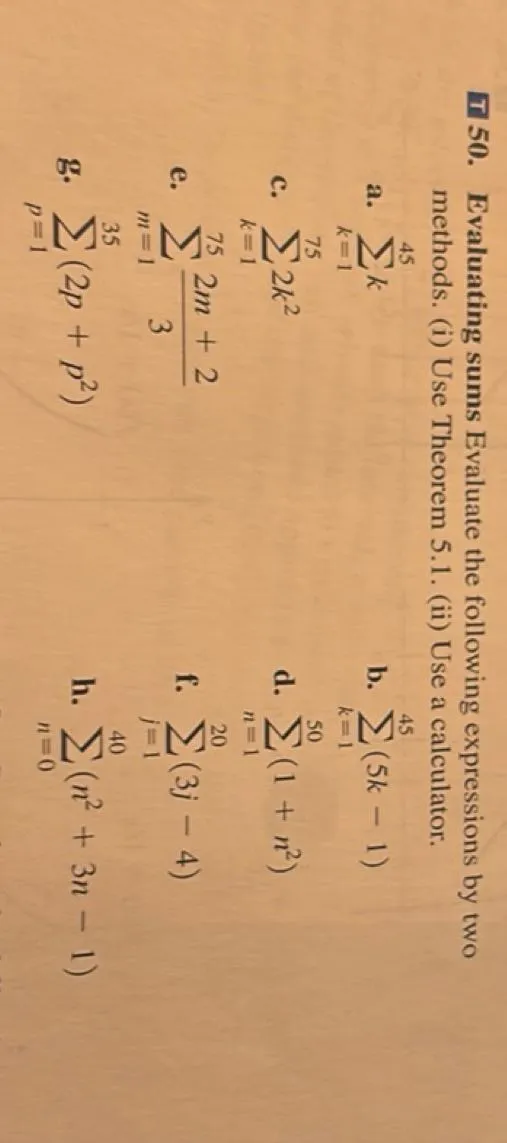Evaluate the sum \(\sum_{k=1}^{45} k\).
Using Theorem 5.1
The formula for the sum of the first \(n\) natural numbers is \(\sum_{k=1}^{n} k = \frac{n(n+1)}{2}\). Applying this formula for \(n = 45\), we get:
\[
\sum_{k=1}^{45} k = \frac{45(45+1)}{2} = \frac{45 \cdot 46}{2} = 45 \cdot 23 = 1035
\]
Using a calculator
Using Python or a calculator, compute the sum directly:
python
sum_k = sum(range(1, 46))
print(sum_k) # Output: 1035
\\(\\boxed{1035}\\)
Evaluate the sum \\(\\sum_{k=1}^{45}(5 k-1)\\).
Using Theorem 5.1
Break down the sum using properties of summation:
\\[
\\sum_{k=1}^{45}(5k - 1) = 5\\sum_{k=1}^{45} k - \\sum_{k=1}^{45} 1
\\]
Calculate each part:
\\[
5\\sum_{k=1}^{45} k = 5 \\cdot 1035 = 5175
\\]
\\[
\\sum_{k=1}^{45} 1 = 45
\\]
Combine the results:
\\[
5175 - 45 = 5130
\\]
Using a calculator
Using Python or a calculator, compute the sum directly:
python
sum_k = sum(5*k - 1 for k in range(1, 46))
print(sum_k) # Output: 5130
\(\boxed{5130}\)
Evaluate the sum \(\sum_{k=1}^{75} 2 k^{2}\).
Using Theorem 5.1
Use the formula for the sum of squares:
\[
\sum_{k=1}^{n} k^2 = \frac{n(n+1)(2n+1)}{6}
\]
Apply the formula for \(n = 75\):
\[
2 \sum_{k=1}^{75} k^2 = 2 \cdot \frac{75(76)(151)}{6} = \frac{75 \cdot 76 \cdot 151}{3} = 25 \cdot 76 \cdot 151 = 286900
\]
Using a calculator
Using Python or a calculator, compute the sum directly:
python
sum_k = sum(2*k**2 for k in range(1, 76))
print(sum_k) # Output: 286900
\\(\\boxed{286900}\\)
Evaluate the sum \\(\\sum_{n=1}^{50}\\left(1+n^{2}\\right)\\).
Using Theorem 5.1
Break down the sum:
\\[
\\sum_{n=1}^{50} (1 + n^2) = \\sum_{n=1}^{50} 1 + \\sum_{n=1}^{50} n^2
\\]
Calculate each part:
\\[
\\sum_{n=1}^{50} 1 = 50
\\]
\\[
\\sum_{n=1}^{50} n^2 = \\frac{50(51)(101)}{6} = 42925
\\]
Combine the results:
\\[
50 + 42925 = 42975
\\]
Using a calculator
Using Python or a calculator, compute the sum directly:
python
sum_n = sum(1 + n**2 for n in range(1, 51))
print(sum_n) # Output: 42975
\(\boxed{42975}\)
\(\boxed{1035}\)
\(\boxed{5130}\)
\(\boxed{286900}\)
\(\boxed{42975}\)






